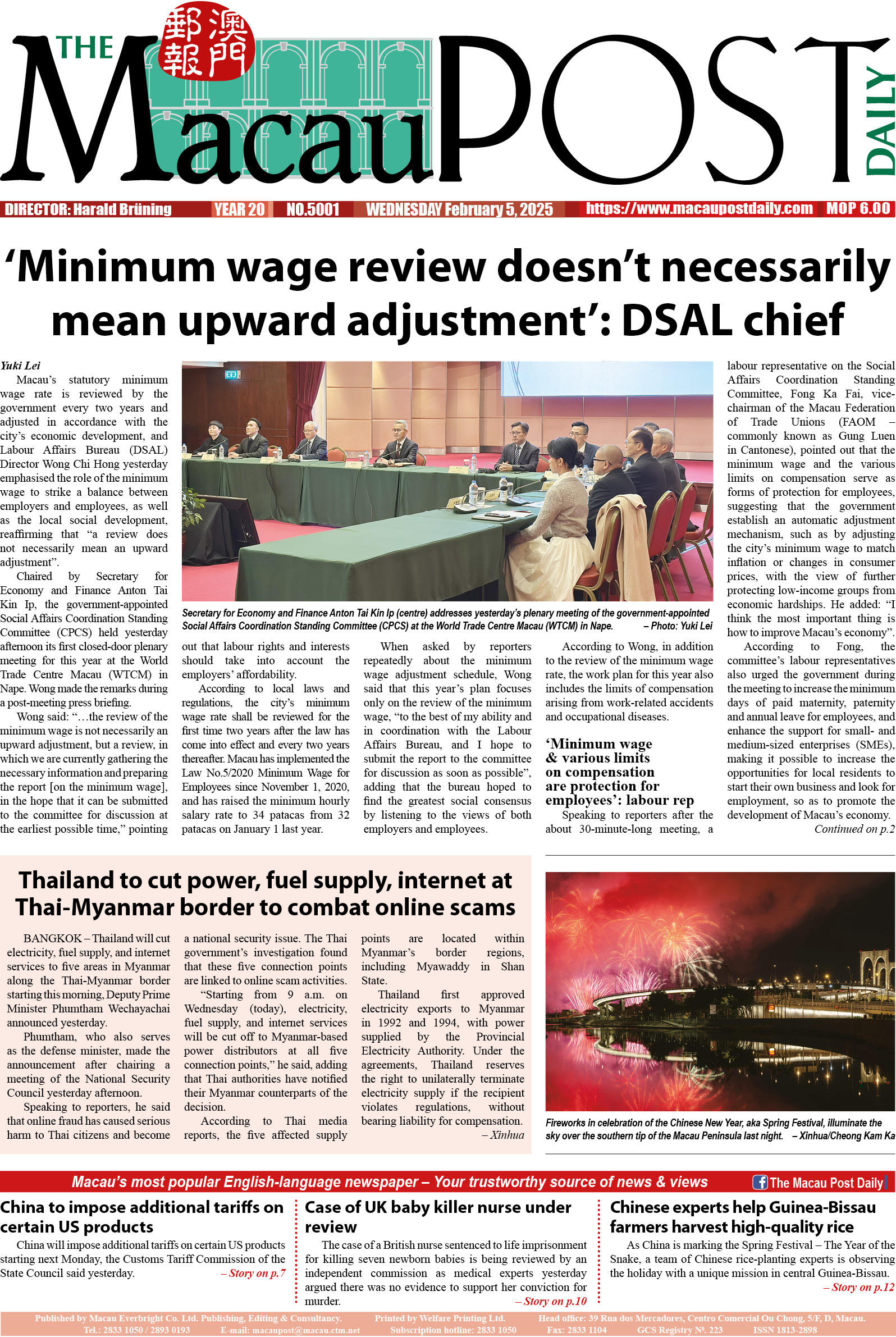When asked what his most memorable event in 2020 was, Paul Pun Chi Meng, secretary-general of Caritas Macau, paused for a moment and said: “Almost 2,000 [people] came within an eight-hour period after Caritas Macau posted a notice about a free food distribution.”
They were mostly Filipinos and Vietnamese.
Paul noted that due to COVID-19, hundreds of non-resident workers did not have their employment contracts renewed. Even worse, they could not return home and were, and still are, stranded in Macau without any income due to the predicament.
Some local citizens have asked Paul why Caritas Macau, without any subsidy from the government, helped those who were not residents and just came here to work from other countries.
He explained to me that Caritas around the world is [here] to help “The Least, the Lost, and the Last”. It does not matter who they are and where they live.
“As an immigrant and international city, we should embrace and lend a hand to those who need help,” he said.
I asked Paul if Caritas Macau aims to alleviate any particular suffering or help any specific group. He said “no”, adding: “Caritas Macau will patch a pothole in the road when there is one not taken care of.” The pothole he referred to is a community problem.
Paul gave a few examples of what he referred to as the pothole or community problem. Caritas Macau: i) established São João de Brito School in 1985 when many young teenagers did not go to school; ii) rolled out an outreach service in 1992 when many young teenagers hung out late at night in the streets; iii) expanded an elderly service when working families could not devote enough time to take care of their parents and/or grandparents.
Like me, many are perplexed by the numerous social services provided by Caritas Macau and other charitable organisations as Macau prides itself on being one of the world’s richest economies in terms of per capita GDP. But, explained Paul, “Macau’s economic success has only changed the nature of the social services”.
Previously, the unemployment rate consistently hovered below 2 percent and the labour participation rate was very high, only to rise amid the COVID-19 pandemic. Technically speaking, before the pandemic Macau was in full employment. It is also true that people’s income had increased significantly.
Paul said, “Fr. Luis Ruiz Suárez founded the Casa Ricci Social Services Centre in the 1950s, which in 1971 joined Caritas Internationalis and was renamed Caritas Macau.
Some two decades afterwards, Macau’s economy was still rather underdeveloped. Those who needed help were primarily poor families and refugees. When the economy started to flourish and grew tremendously after the 1999 transfer of administration, people began to face different kinds of difficulties.
As prosperity grew, property prices and private medical care also became more expensive. Many families moved their parents to government-subsidised elderly centres operated by Caritas Macau and other charitable organisations. Like all developed countries, a booming economy will not benefit people across the board. Caritas Macau operates a government-subsidised food bank to help those left behind.
Paul said, “A more competitive society breeds a lot of mental distress. When the suicide rate rose, Caritas Macau launched a 24/7 hotline service to listen and counsel those with emotional problems. It also operates a number of shuttle services to help the sick get medical consultation and the disabled to join outdoor social activities”.
I asked Paul if there is one more service he still wants to provide. Without hesitation, he said: “A small hospital.” This idea, he emphasised, was proposed at a meeting and even mentioned in its minutes many years ago. He wanted Caritas Macau to give people, especially non-resident workers, a more affordable choice of hospital care.
Many non-resident workers do not go to see a doctor even when they are sick. Their income, especially those of domestic helpers and security guards, is very low. They are not entitled to public medical care and health insurance cover is not required.
Paul said, “The government will conduct a satisfaction survey on its subsidised services operated by Caritas Macau”. What is more important and satisfying to him is that “Caritas Macau’s work has inspired many people volunteering to help the needy.”
Paul’s first encounter with Caritas Macau was when he studied at its Social Workers Programme in 1979. He became Fr. Suárez’s secretary after completing his overseas studies in 1990. Paul succeeded Fr. Suárez in 2000.
“When are you going to retire?” I asked. Paul replied with a grin and said: “I will never retire because only work energises me.” However, he was quick to add while he knew that one day he would leave Caritas Macau he would nevertheless continue to serve the community, but in a different role.
I finally asked how he expected his successor to lead Caritas Macau after he left the Catholic organisation? He said, “To carry on and further my work without regard to how much I am rewarded.”
* Lee is a member of Caritas Macau’s Supervisory Council
N.B. “The last, the least, and the lost” is an amalgam of three verses in the book of Matthew in the New Testament of the Bible:
The Last: “So the last will be first, and the first will be last” Matthew 20:16 NIV
The Least: “The King will reply, ‘Truly I tell you, whatever you did for one of the least of these brothers and sisters of mine, you did for me.’” Matthew 25:40 NIVThe Lost: “For the Son of Man came to seek and to save the lost” Matthew 18:11 NIV
https://medium.com/lastleastlost/

Undated file photo of Caritas Macau Secretary-General Paul Pun Chi Meng provided by the author





